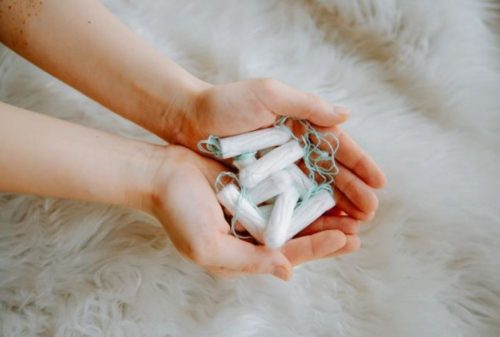As we are all well aware, Coronavirus has impacted every aspect of our lives: the daily commute now consists of walking from our beds to our couches; the pub is a Zoom call; a hobby is baking endless loaves of banana bread. Lockdown has impacted everyone; this is undeniable.
However, as many of us savour the ability to spend all day in pyjamas or even relish not needing an excuse to stay in and binge Tiger King, there are people for whom this lockdown is not a break, it is breaking them. There are harsh realities that must be faced for vast groups in our society. One such group is those who get their periods.

According to Plan International’s 2017 report, one in ten girls in the UK aged between 14 and 21 were completely unable to afford menstrual products. One in seven girls had to borrow menstrual products from a friend due to an unaffordability. These statistics are alarming; even in a non-pandemic-altered world.
But, according to their survey published on 6 May, in Coronavirus-ridden-2020 Plan International UK revealed that the one in every ten girls unable to afford period products increased to three in ten. Families are out of work, furloughed or still waiting for temporary government welfare to reach their accounts. A staggering number of those experiencing their periods had to use makeshift options due to lower household incomes; 54% of young women have been using toilet paper, which in itself has significant health complications. There are many are now going without as they are isolating away from friends, colleagues and clinics that were previously their only options.
Furthermore, stockpiling is driving up menstrual product prices and reducing accessibility. The panic and entitlement of our commercially driven culture is causing more and more people to go without daily necessities. Menstrual products are daily necessities. Would you expect people to without toilet paper? No, so why do we expect women to go without period products?

“I use the contraceptive pill to manage my symptoms, without it during lockdown I get incredibly painful cramps, migraines and crippling back ache”.
In addition to this, there are difficulties in accessing medical menstrual needs such as the contraceptive pill. Anna from Manchester told us that she was planning to return to the pill following difficult period symptoms but that she cannot obtain her prescription due to lack of accessibility to a doctor. The side effects she experiences include “incredibly painful cramps, migraines and crippling back ache”. In Anna’s personal experience, these are eased with the pill. However, until she has access to her GP, she’s forced to deal with the pain and inconvenience; and of course, Anna won’t be an isolated example.
The socio-economic impact this is having on effectively, half the population, is startlingly obvious. And yet, I do not see the masses of media coverage as I see with toilet paper. I do not see front pages with pictures of empty shelves of tampons. They are there, the women who need them are there, so where is the media? Still afraid to break the stigma?
Despite the troubling consequences, this is not an issue without a solution. I was inspired by ITVnews, among other outlets, with their weekly stories to make you smile and thought alongside raising awareness of the struggles that I would shed some light on the positives with, of course, a period twist.
 These examples make me smile but the smile falters when I remember that these rays of light are shrouded in cloud. Issues include the efficacy of the free school meal packages (and it is widely rumoured that this system is not without flaws), as well as the existing stigma in regard to accessing food banks.
Daily life is different. This is a fact that we cannot escape from. However, we are able to help those who menstruate to escape from the crippling issues that lockdown has imposed or worsened. Do not stockpile. Do provide virtual support systems. Do not extend this situation by ignoring the rules. And finally, do remember that, (to paraphrase the Queen), we will meet again…to sew reusable pads together!
These examples make me smile but the smile falters when I remember that these rays of light are shrouded in cloud. Issues include the efficacy of the free school meal packages (and it is widely rumoured that this system is not without flaws), as well as the existing stigma in regard to accessing food banks.
Daily life is different. This is a fact that we cannot escape from. However, we are able to help those who menstruate to escape from the crippling issues that lockdown has imposed or worsened. Do not stockpile. Do provide virtual support systems. Do not extend this situation by ignoring the rules. And finally, do remember that, (to paraphrase the Queen), we will meet again…to sew reusable pads together! 
Olivia Hall
Olivia, 16, is currently studying for her GCSEs in Greater Manchester. Olivia is a strong advocate for the rights of women and girls, a keen writer and reader.



